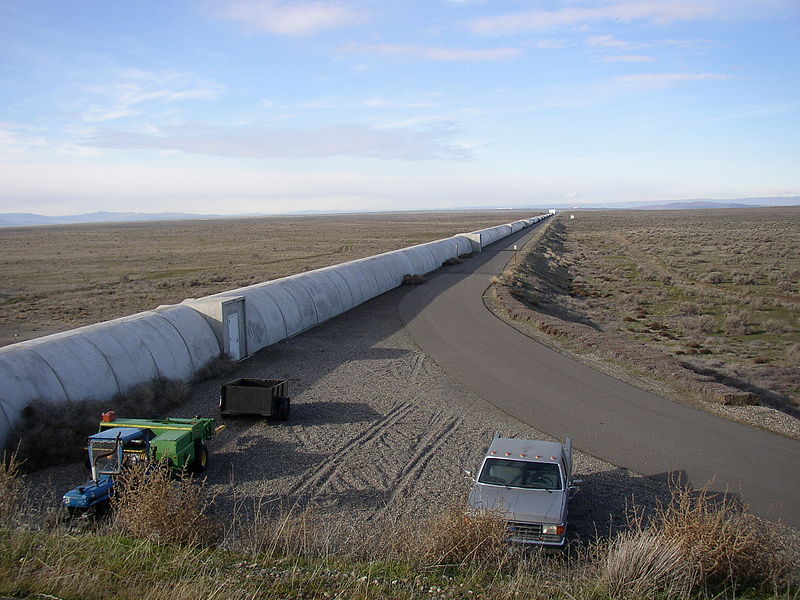Concept art of a binary star system producing gravitational waves. Image: NASA/Tod Strohmayer (GSFC)/Dana Berry (Chandra X-Ray Observatory)
A century after Albert Einstein first predicted the existence of gravitational waves, scientists may have finally nabbed the first direct detection of them. At least, that's the word on the street since the Laser Interferometer Gravitational-Wave Observatory (LIGO) released a statement on Monday promising a "status report" on their progress in searching for these elusive ripples in spacetime."News from LIGO sounds exciting," said theoretical physicist and author Lawrence Krauss on Twitter. "Not tweeting details before Thurs. Two days left before a new era in astronomy and physics could begin."Indeed, Krauss is one of many scientists who have been speculating for months that LIGO has cinched this key piece of the relativistic puzzle ever since the observatory restarted operations last autumn. As a result, there is a lot of accumulated hype built up over this (hopefully) momentous announcement. If it turns out that LIGO is merely announcing an upgrade or a change of staff, the scientific community is going to utter a collective sigh of regret for its unbridled optimism.PBS speculation on LIGO's potential detection, in October 2015. Video: PBS Space Time/YouTubeBut if LIGO has, in fact, produced direct evidence of gravitational waves, it will be a major step forward for the astrophysical and cosmological communities, and a big win for science as a whole.Gravitational waves are thought to be emitted by the asymmetrical acceleration of massive objects—for instance, an explosion of a "lumpy" star or a highly elliptical orbit of two black holes. Much like dropping a stone into a lake, these events produce ripples on a cosmic scale, which gravitationally warp the very fabric of spacetime as they sweep through the universe. Einstein predicted this phenomenon based on his overall theories about the curvature of space, put forth in his general theory of relativity.But though strong gravitational waves are forged by extreme conditions, they have proven to be pretty much imperceptible from our vantagepoint on Earth.Scientists have plenty of indirect evidence that these ripples in the universe's fabric sweep through our midst all the time, but catching one in the act has proven to be a daunting challenge considering how weakly gravity interacts with matter. We are talking about a force that is 10 thousand billion billion billion billion times more subtle than electromagnetism. Talk about a light touch.Indeed, gravitational waves are so hard to pin down that Italy's Virgo observatory and even the original incarnation of LIGO have been unable to trip this particular cosmic wire, though there have been a few false positives.As a result, LIGO announced that it was shutting down in 2010 in order to dramatically upgrade its two massive laser interferometers, which are located in Hanford, Washington, and Livingston, Louisiana. On September 18, 2015, the new and improved "Advanced LIGO" began operations, which is why everyone has been so on edge to catch wind of its findings. If the rumors are true, and LIGO is on the verge of announcing the first direct detection of gravitational waves, then it will signal the end of a century-long hunt for this slippery white whale of cosmology. These ripples are the last holdout from Einstein's general theory of relativity to have evaded confirmation by direct evidence. A detection would further validate that seminal work, and spark new inroads into resolving the inconsistencies between classic cosmological theories with quantum mechanics.Furthermore, a detection would be the ultimate proof of concept for facilities like LIGO, and would provide us with one more crucial data point for interrogating the universe. Telescopes have allowed us to peer into the deepest corners of time and space, but with functional gravitational wave detectors, scientists will be able to "hear" the underlying music of the universe as well. Slowly but surely, we are building technological sensory organs that will open our eyes and ears to the great beyond.Of course, this all hinges on the recent gossip about LIGO being on point. At the risk of over-hyping, our prediction is that it is "true, all of it," to channel Han Solo. But you'll have to check back on Thursday to find out, and either make fun of us for buying the rumors or to celebrate the fact that puny Earthlings like us have, at last, caught the ultimate cosmic wave. Surf's up, friends. Don't bail.
If the rumors are true, and LIGO is on the verge of announcing the first direct detection of gravitational waves, then it will signal the end of a century-long hunt for this slippery white whale of cosmology. These ripples are the last holdout from Einstein's general theory of relativity to have evaded confirmation by direct evidence. A detection would further validate that seminal work, and spark new inroads into resolving the inconsistencies between classic cosmological theories with quantum mechanics.Furthermore, a detection would be the ultimate proof of concept for facilities like LIGO, and would provide us with one more crucial data point for interrogating the universe. Telescopes have allowed us to peer into the deepest corners of time and space, but with functional gravitational wave detectors, scientists will be able to "hear" the underlying music of the universe as well. Slowly but surely, we are building technological sensory organs that will open our eyes and ears to the great beyond.Of course, this all hinges on the recent gossip about LIGO being on point. At the risk of over-hyping, our prediction is that it is "true, all of it," to channel Han Solo. But you'll have to check back on Thursday to find out, and either make fun of us for buying the rumors or to celebrate the fact that puny Earthlings like us have, at last, caught the ultimate cosmic wave. Surf's up, friends. Don't bail.
Advertisement
Advertisement
